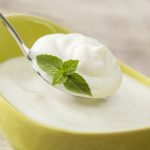
- The World Health Organisation regards iodine deficiency as the ‘world’s most prevalent, yet easily preventable, cause of brain damage’.
Researchers from the University of Surrey are saying that trendy non-dairy alternatives like almond, coconut and soya milks might be putting the general public at risk because of iodine deficiency. This comes at a time when the popularity of plant-based non-dairy milk alternatives continues to grow with sales increasing by 61% since 2012. The value of the non-dairy milk market is now $2.11bn according to Mintel.
The less positive findings come from a lack of consumption of dairy milks which contain iodine was reported in the British Journal Of Nutrition.
The iodine content from 47 dairy-free beverages including coconut (6), soya (14), almond (11), oat (6), rice (5), hazelnut (3) and hemp (2), but excluding those marketed specifically at infants and children. The numbers in parenthesis are those of the products tested and found on the retailer’s shelf.
The content was compared with semi-skimmed cows’ milk. The study found that the majority of drinks analysed contained inadequate levels of iodine. The concentration levels were just two per cent of that found in proper dairy milk.
Iodine is a non-metallic mineral needed for the production of thyroid hormones such as thyroxine, which control overall cellular functions associated with energy metabolism. It is especially important during pregnancy as it is essential for normal fetal brain development. Cows’ milk and dairy products such as yogurt are the main source of this mineral for British people. An estimated 70 per cent of teenage girls in Britain are iodine-deficient whilst dairy milk is the main source of the mineral in our diet, providing 40 per cent of the average daily intake.
Professor of Nutritional Medicine, Margaret Rayman of the University of Surrey, stated:
“Many people are unaware of the need for this vital dietary mineral as it is important that people who consume milk-alternative drinks realise that they will not be replacing the iodine from cows’ milk which is the main UK source of iodine. This is particularly important for pregnant women and those planning a pregnancy.”
“A glass of a milk-alternative drink would only provide around 2 micrograms of iodine which is a very small proportion of the adult recommended intake of 150 micrograms/day. In pregnancy, that recommendation goes up to 200 micrograms/day.”
Dr Sarah Bath, Lecturer in Public Health Nutrition at the University of Surrey and registered dietitian, then added:
“Milk-alternative drinks are increasingly being used as a replacement for cows’ milk for a number of reasons that obviously include allergy or intolerance to cows’ milk.”
“Worryingly, most milk-alternative drinks are not fortified with iodine and their content of this dietary mineral is very low. If avoiding milk and dairy products, consumers need to ensure that they have other dietary sources of the mineral, where possible.”
“If considering taking an iodine supplement, they should avoid kelp which can provide excessive amounts.”
Previous research from the University of Surrey shows an association with low levels of iodine in pregnant women with lower IQ and reading scores in their children up to the age of nine. Iodine deficiency is much more common than people think. Organic milk is also low on iodine which would also be an issue for pregnant mothers babies and young children ((see article).
Vegans and vegetarians as well as pregnant women need to be more aware of lack of iodine and the impact it can have on general health. Having said this, a healthy balanced diet should provide all the iodine that is needed. Good sources of iodine include fish especially white fish like haddock and cod which contains more than oily fish, eggs, nuts, meats, bread, dairy products and seaweeds (kelp already mentioned).
One overriding thought about dairy-free milks is they should be fortified with iodine as well as essential nutrients such as B12, calcium and vitamin D. Clearly the general public are unaware that iodine is missing from dairy-free milks.



have you read ‘iodine – Why You Need It’ by David Brownstein. It is a very interesting book especially for anyone with thyroid problems or any other iodine deficiency issues. Looks to be well researched too.
I commented on other sites where lack of iodine generally in food is a problem and I am not surprised about the lack of it in nut milks. I think anyone who has issues will probably be on meds including iodine tablets or seaweed anyway.
Not sure about the iodine problem but I know these dairy free milks do not work in milk either. Just keep separating. I’ve tried warming it and then adding to coffee but absolutely no luck whatsoever. Seems great with cheese sauce although there is a slight flavour and I like ot with grits and porridge. Mind you I am a black coffee drinker anyway so it is never a problem for me.